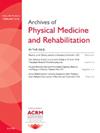Ginkgo biloba extract: Mechanisms and clinical indications
Abstract
Diamond BJ, Shiflett SC, Feiwel N, Matheis RJ, Noskin O, Richards JA, Schoenberger NE. Ginkgo biloba extract: mechanisms and clinical indications. Arch Phys Med Rehabil 2000;81:668-78. Objective: Ginkgo biloba may have a role in treating impairments in memory, cognitive speed, activities of daily living (ADL), edema, inflammation, and free-radical toxicity associated with traumatic brain injury (TBI), Alzheimer's dementia, stroke, vasoocclusive disorders, and aging. The purpose of this review is to provide a synthesis of the mechanisms of action, clinical indications, and safety of Ginkgo biloba extract. Data Sources: Empirical studies, reviews, chapters, and conference proceedings were identified in the following databases: Medline, the Research Council for Complementary Medicine based on the British Library database, and PsychInfo. Ginkgo biloba, EGb 761, Tanakan, Tebonin, Rokan, and LI 1370 were the principal index terms. Study Selection and Data Extraction: Controlled clinical studies with both positive and negative findings are included, in addition to animals studies illustrating mechanisms of activity. Data Synthesis: Ginkgo has shown activity centrally and peripherally, affecting electrochemical, physiologic, neurologic, and vascular systems in animals and humans with few adverse side effects or drug interactions. Ginkgo shows promise in patients with dementia, normal aging, and cerebrovascular-related disorders. Clinical indications include memory, information processing, and ADL. Conclusions: Ginkgo shows promise in treating some of the neurologic sequelae associated with Alzheimer's disease, TBI, stroke, normal aging, edema, tinnitus, and macular degeneration. Mechanisms of action may include antioxidant, neurotrans mitter/receptor modulatory, and antiplatelet activating factor properties. While safe, caution is advised when recommending ginkgo to patients taking anticoagulants. Future studies should examine dose effects, component activity, mechanisms, and clinical applications. ? 2000 by the American Congress of Rehabilitation Medicine and the American Academy of Physical Medicine and Rehabilitation





